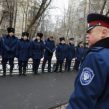
Cossack Patrols in Stavropol Receive Stronger Policing Powers
Publication: Eurasia Daily Monitor Volume: 13 Issue: 47
By:

The government of Stavropol region is set to expand the powers of Cossack patrols in the region. According to new legislation proposed by the regional council, citizens who disobey Cossack patrols now will be subject to fines. Meanwhile, Cossack leaders say that citizens already do not disobey Cossack patrols, given that the Cossacks patrol alongside the local police. Back in July 2014, legislation was introduced giving the existing voluntary people’s patrols (dobrovolnaya narodnaya druzhina) the right to fine people who disobeyed them. These voluntary people’s patrols are a shadow of those of the Soviet period: today, civilians are much less willing to serve in them and there are far fewer large government enterprises where the bosses can order employees to carry out their “voluntary” duty. Now, the government wants to expand the right to fine people who disobey the Cossack patrols. Indeed, the Russian government seems to celebrate the Cossacks as defenders of the motherland. The government also provides resources to the Cossacks, which means they can afford to serve in the “voluntary” patrols to help the police (Kavkazskaya Politika, February 27, 2016).
The history of Cossacks in the North Caucasus is quite complex. In Tsarist Russia, the government used the Cossacks to instill fear and obedience in the local population of the North Caucasus. Cossack settlers were militarized agriculturalists who were supported by the Russian government. Because they provided for themselves and their families, the Cossacks were cheaper for the Russian government to sustain than the regular military forces. Many of the Terek and Kuban Cossacks came from Ukraine and settled the region on the orders of the Russian Tsar. After the 1917 revolution, the Cossacks turned out to be supportive of the Tsarist regime and thus were targeted by the Bolsheviks, who used the locals’ resentment against them. Much of the Cossack estate was destroyed physically, but after the Cossacks were smashed (Kavkazskaya Politika, January 24), the Bolsheviks turned against the local North Caucasians.
Over the past two or three decades, “de-Cossackization” in the North Caucasus has been reversed. Now, the authorities are attempting to revive the Cossacks and rebrand them as defenders of the Russian state in the North Caucasus, rather than as a separate ethnic group. The government consistently deprives Cossack societies in the North Caucasus of their rights, such as the right to elect their own leaders. Instead, the government provides incentives for the Cossacks to become informal Russian soldiers. Cossacks have fought on Russia’s behalf in various regional wars in the post-Soviet space—the latest example being the conflict in Ukraine (Mk.ru, May 15, 2014). Cossacks were ideal soldiers for irregular, “hybrid” warfare, especially with weaker states like Georgia, Moldova and the Chechen Republic of Ichkeria. However, in Ukraine, the Cossack forces were eventually relegated to secondary roles because they were no match for the better organized and larger fighting forces of Ukraine (Big-rostov.ru, June 9, 2014).
Modern-day Cossacks may not be good soldiers in large-scale wars, but Moscow still regards them as an important part of the grand strategy of keeping the ethnic-Russian population in the North Caucasus. Ethnic Russians have been leaving the region over the past 50 years, at least since the 1970s; yet, the government is hoping to reverse the tide by installing militarized Cossack militias across the region. The lawfulness of this move is dubious, but the rationale of the Russian government is quite straightforward. Regular police forces are not “Russian” enough, because members of any nationality can serve in them. Cossacks are supposed to be Christian Orthodox and Russian-speaking. Cossacks are thus much more preferred by the ethnic Russians and the government of Russia than the regular police force.
In return for serving the (ethnic-Russian) public and the interests of the Russian government, they receive parcels of land in the region. The exchange somewhat resembles the relationship between the Tsarist government and the Cossacks in the past. The difference is that capitalism sometimes wins out and businesses rather than Cossacks receive the land, thwarting the Cossacks’ aspirations (Kavkazskaya Politika, January 28).
The expansion of Cossack rights in Stavropol is turning the region into Russia’s “frontier” in the North Caucasus. It is unclear, however, what the long-term consequences of the move will be. If the government grants Cossacks special privileges, other social groups can also claim such rights. In response to the government policy of “Cossackization,” the North Caucasian republics have created their own “Cossacks,” who are often neither Russian-speaking nor Russian Orthodox. It is also unclear what the future of the Cossack forces will be. If Moscow drops its policy of territorial expansion and engaging in demographic competition with its own citizens in the North Caucasus, the Cossacks could go out of business. That time, however, has not yet come.




